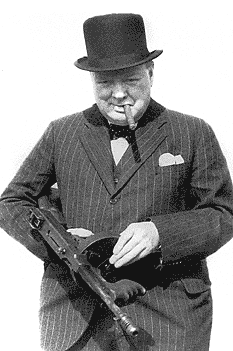Jaw-jaw may be better than war-war…
 …but not by much, and possibly less for actually getting things done. Or such is the upshot of Joshua Muravchik’s piece in the new Commentary. A brisk jog through the history of twentieth-century summitry and other high-level diplomatic stunts, he concludes:
…but not by much, and possibly less for actually getting things done. Or such is the upshot of Joshua Muravchik’s piece in the new Commentary. A brisk jog through the history of twentieth-century summitry and other high-level diplomatic stunts, he concludes:
To say that talking with our enemies has more often done harm than good does not mean that we should always avoid it. But when we do speak, it is essential that we eschew the conceit that, whoever they may be and whatever their own purposes, it lies within our power to manipulate or seduce them into becoming friends or serving our interests. If they have truly undergone a metamorphosis and wish to revise their relations with us, they will find ways to let us know about it—as happened, despite early missed signals, both in the case of Mao and Chou and in that of Sadat. That is why it is preposterous to assert, as some continue to do, that at a certain moment in 2003 Tehran sent a message through a Swiss diplomat that it was ready to settle all of its differences with Washington—but, because the Bush administration failed to seize the opportunity, the moment was lost forever.
What is essential is to understand whom we are talking to. In particular, messianic revolutionary regimes operate in a moral universe whose values are antithetical to ours. Their goal in talking is virtually never to have better relations for their own sake, but to have the advantage of us. The fatal allure of transformative diplomacy is that, by means of summitry, the lions can be charmed not just into lying down with lambs but into becoming lambs. That goal is a chimera; it has never happened.
Finally, we must always remember that such regimes are in a state of permanent war with their own subjects, and that every measure of legitimation they receive from the outside serves to discourage those subjects’ hopes for freedom and impair their will to resist. Even the government of the Soviet Union, our superpower counterpart, was eager for the symbolism of being treated by America as an equal. How much more so would the power of the petty tyrants or would-be tyrants who rule Iran, Syria, Venezuela, Cuba, and North Korea—the countries with whose leaders Barack Obama expressed his readiness to meet and talk in the first year of his administration—be inflated by an audience with an American President. In this, especially, there is much to be lost—by ourselves and by those under their rule.
Should we talk with our enemies? Yes—to tell them what we think of them, and what we ourselves stand for. We should talk to them, that is, on our own terms and not theirs, and with their captive peoples in mind. But to the question that Anderson Cooper put to Senator Obama, the simple and correct answer was “No.” If Obama ever gains the presidency, the world will be safer if he has figured that out before he enters office.
Once again, the Fallacy of Foreign-Policy Egocentrism rears its ugly head. Diplomacy has real, hard limits. And as much as we must avoid war whenever possible, we have to recognize that it’s not always possible and that even short of war, we must wield sticks in addition to dangling carrots.
Don’t ask impertinent questions like that jackass Adept Lu.
